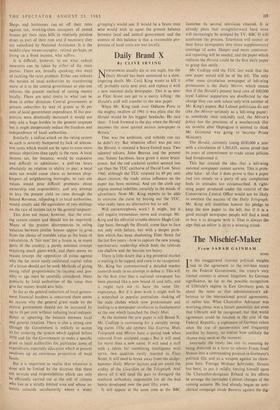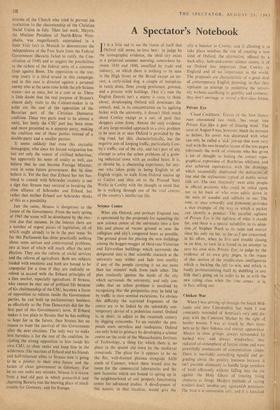The Mischief-Maker
From SARAH GAINHAM
BONN
TN the exaggerated internal political weights _Vied to the agreement to the test-ban treaty by the Federal Government, the treaty's very limited content is almost forgotten. Its German significance, so far as the possible recognition of Ulbricht's regime in East Germany goes, is about the same as that administration's ad- herence to the international postal agreements, or rather. less. What Chancellor Adenauer was worrying about was a future possibility not even that Ulbricht will be recognised, but that world agreement could. be reached at the cost of the Federal Republic, a nightmare of German rulers since the rise of nation-states and frequently justified by history, no matter how unlikely the chance may seem at the moment.
Internally the treaty has lost its meaning by being distorted as a lever to rehoist Franz Josef Strauss into a commanding position in Germany's political life, and as a weapon against its cham- pion here, Foreign Minister Schroeder. Strauss has been, to put it mildly, forcing himself upon the Chancellor-designate Erhard in his efforts to arrange the inevitable Cabinet changes of the coming autumn. He had already begun an anti- clerical campaign inside Bavaria against the'dig- nitaries of the Church who tried to prevent his re-election to the chairmanship of the Christian Social Union in July. Then last week, Meyers, the Minister President of North-Rhine West- phalia, was magnificently entertained in a State Visit (sic) to Munich to demonstrate the independence of the Free State from the Federal Government (Bavaria failed to ratify the Con- stitution of 1949) and to suggest the possibilities to the richest of the federal units of a common front against Bonn. The opposition to the test- stop treaty is a third strand in this campaign, and in this case is directed against a personal enemy who at the same time holds the job Strauss wants—not at once, but in a year or so. There is little doubt that the real purpose of Strauss's almost daily visits to the Cabinet-maker is to point out 'the cost of the opposition of the Bavarian part of the Christian Democrat coalition. These two parts used to be almost a unity, but lately the CSU part has been more and more presented as a separate party, making the coalition one of three parties instead of' a double-party and a smaller partner.
It seems unlikely that even this excitable demagogue, who since his forced resignation has lost not only the veneer of civilised behaviour, but apparently his sense of reality as well, can believe that he can become Foreign Minister, even in some future government. But he does believe it. Yet the fact that Erhard has not has- tened to consult with Schroeder recently is not a sign that Strauss may succeed in breaking the close alliance of Schroeder and Erhard, but rather that neither Erhard nor Schroeder thinks of this as a possibility.
Just the same, Strauss is dangerous to the future of the Government. From the early spring of 1965 the scene will be dominated by the elec- tion due that autumn. In the interim there are a number of urgent pieces of legislation, all of which ought already to be in the past tense. So far this Parliament has done practically nothing about some serious and controversial problems, two at least of which will much affect the next election. They are the reform of social services and the reform of agriculture. Both are subjects loaded with emotions and both are bound to be unpopular for a time if they are radically re- solved in accord with the Erhard principles of a free market, especially agriculture. If Strauss, who cannot be shut out of political life because of his chairmanship of the CSU, becomes a focus of opposition to reform inside the Government parties, he can hold up parliamentary business as effectively as the Free Democrats did for the first part of this Government's term. if Erhard makes it too plain to Strauss that he has nothing to hope for in the future, then Strauss has no reason to want the survival of this Government after the next elections. The only way to make him harmless is for the rest of the coalition, in- cluding the strong opposition to him inside his own CSU, to close ranks and keep him in the wilderness. The reaction of Erhard and his friends and half-reluctant allies to Strauss now is going to be a pointer to their own future and the future of clean government in Germany. For let no one make any mistake, Strauss is a return from a bad old past in which gemnetlich and charming Bavaria was the brewing place of much trouble for Germany, and for Europe.































 Previous page
Previous page